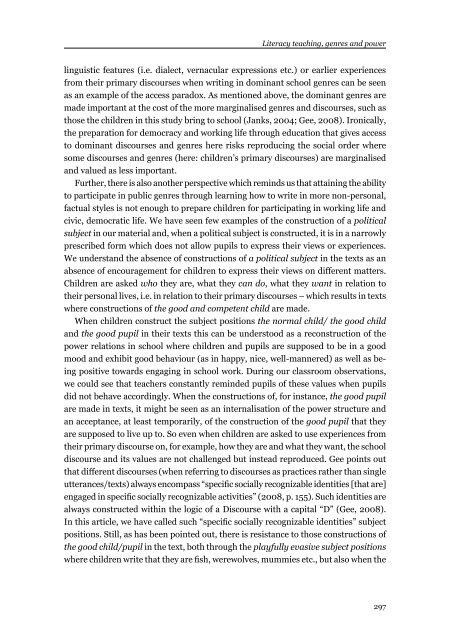Download issue - Umeå universitet
Download issue - Umeå universitet
Download issue - Umeå universitet
Create successful ePaper yourself
Turn your PDF publications into a flip-book with our unique Google optimized e-Paper software.
Literacy teaching, genres and power<br />
linguistic features (i.e. dialect, vernacular expressions etc.) or earlier experiences<br />
from their primary discourses when writing in dominant school genres can be seen<br />
as an example of the access paradox. As mentioned above, the dominant genres are<br />
made important at the cost of the more marginalised genres and discourses, such as<br />
those the children in this study bring to school (Janks, 2004; Gee, 2008). Ironically,<br />
the preparation for democracy and working life through education that gives access<br />
to dominant discourses and genres here risks reproducing the social order where<br />
some discourses and genres (here: children’s primary discourses) are marginalised<br />
and valued as less important.<br />
Further, there is also another perspective which reminds us that attaining the ability<br />
to participate in public genres through learning how to write in more non-personal,<br />
factual styles is not enough to prepare children for participating in working life and<br />
civic, democratic life. We have seen few examples of the construction of a political<br />
subject in our material and, when a political subject is constructed, it is in a narrowly<br />
prescribed form which does not allow pupils to express their views or experiences.<br />
We understand the absence of constructions of a political subject in the texts as an<br />
absence of encouragement for children to express their views on different matters.<br />
Children are asked who they are, what they can do, what they want in relation to<br />
their personal lives, i.e. in relation to their primary discourses – which results in texts<br />
where constructions of the good and competent child are made.<br />
When children construct the subject positions the normal child/ the good child<br />
and the good pupil in their texts this can be understood as a reconstruction of the<br />
power relations in school where children and pupils are supposed to be in a good<br />
mood and exhibit good behaviour (as in happy, nice, well-mannered) as well as being<br />
positive towards engaging in school work. During our classroom observations,<br />
we could see that teachers constantly reminded pupils of these values when pupils<br />
did not behave accordingly. When the constructions of, for instance, the good pupil<br />
are made in texts, it might be seen as an internalisation of the power structure and<br />
an acceptance, at least temporarily, of the construction of the good pupil that they<br />
are supposed to live up to. So even when children are asked to use experiences from<br />
their primary discourse on, for example, how they are and what they want, the school<br />
discourse and its values are not challenged but instead reproduced. Gee points out<br />
that different discourses (when referring to discourses as practices rather than single<br />
utterances/texts) always encompass “specific socially recognizable identities [that are]<br />
engaged in specific socially recognizable activities” (2008, p. 155). Such identities are<br />
always constructed within the logic of a Discourse with a capital “D” (Gee, 2008).<br />
In this article, we have called such “specific socially recognizable identities” subject<br />
positions. Still, as has been pointed out, there is resistance to those constructions of<br />
the good child/pupil in the text, both through the playfully evasive subject positions<br />
where children write that they are fish, werewolves, mummies etc., but also when the<br />
297

















